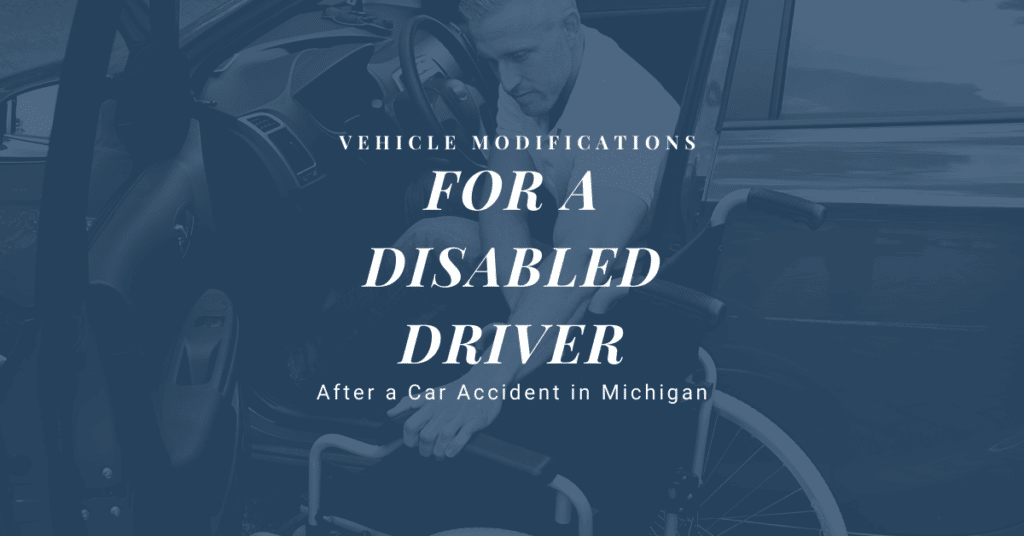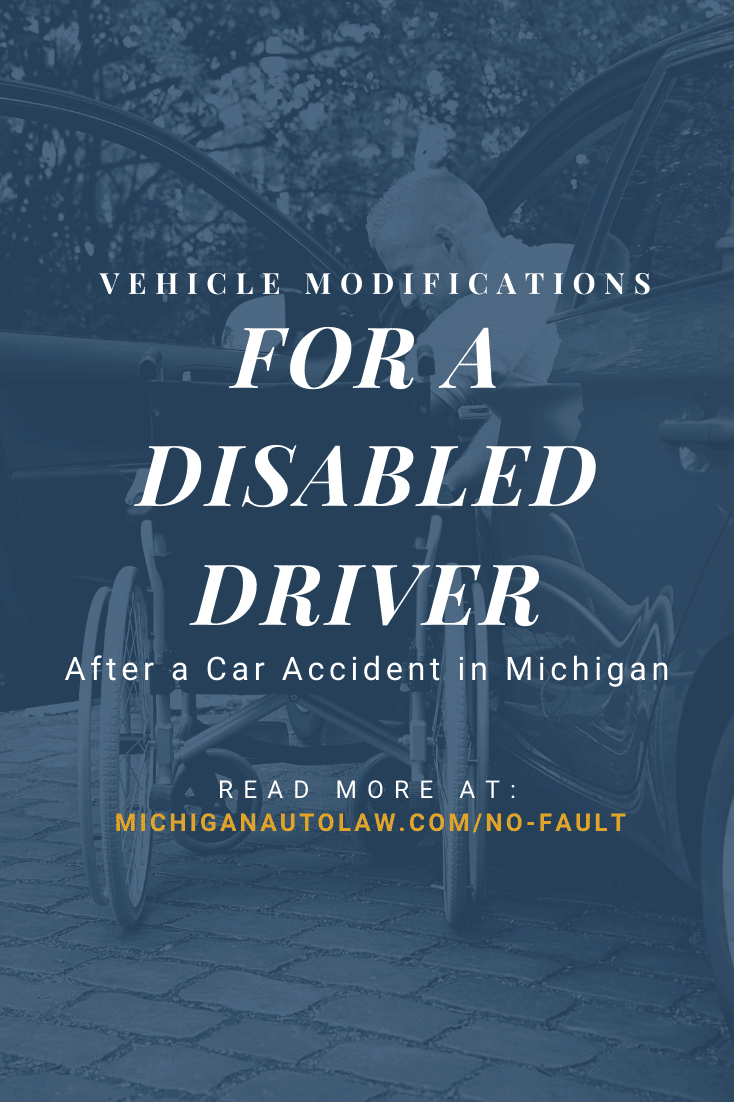
Vehicle Modifications for Disabled Drivers After A Car Accident in Michigan
Vehicle modifications for disabled drivers is one of the PIP benefits that car accident victims may be entitled to under Michigan’s No-Fault law. It involves modifying the victim’s automobile to accommodate his or her accident-related limitations and, thus, make it both accessible and usable by the victim.
What are vehicle modifications for disabled drivers?
Vehicle modifications for disabled drivers are alterations that are made to a car accident victim’s automobile that allow the victim to access and drive his or her automobile. The alterations are made to accommodate the victim’s accident-related physical, mental or functional limitations.
However, in some instances, the changes to the victim’s automobile are inadequate and their limitations can only be accommodated only by purchasing a new automobile that is specifically designed to meet that victim’s personal needs.
When are these No-Fault benefits necessary?
These No-Fault benefits may be necessary when a serious car accident has imposed physical, mental or functional limitations on a car accident victim that make it impossible for him or her to operate his or her automobile in the same manner as before the car accident.
The Michigan Court of Appeals summed up the rationale for these No-Fault benefits in its 1992 decision in Davis v. Citizens Insurance Company of America:
“Transportation is as necessary for an [injured] person as for an [uninjured] person.”
Here are two examples of when the Michigan Court of Appeals has said vehicle modifications for disabled drivers were warranted based on a car accident victim’s accident-related limitations:
- In Davis v. Citizens Insurance Company of America, an automobile alteration was deemed “reasonably necessary” because it had been prescribed by the car accident victim’s physician and the availability of alternative means of transportation was inadequate. This involved the purchase of a van that had been modified to accommodate the needs of the victim whose accident rendered her a paraplegic, confining her to a wheelchair.
- In Begin v. Michigan Bell Telephone Company, et al., an automobile alteration was deemed “reasonably necessary” because the auto accident victim’s “transportation needs were different from those of an uninjured person,” and the modifications sought were “related to care necessitated” by the victim’s accident-related injuries. This involved purchase of a van that had been modified to accommodate the needs of a Michigan auto accident victim whose accident had rendered him a quadriplegic.
How do I make a claim for this No-Fault benefit?
To collect No-Fault benefits to cover vehicle modifications for disabled drivers after you were injured in a car accident, you must file a No-Fault application with the applicable auto insurance within ONE YEAR from the date of your car accident. (MCL 500.3145(1))
If you fail to file your No-Fault application (which is also called an “application for No-Fault benefits” or “notice of injury”) on time – within one year from the date of your car accident – then you will forever lose any benefits to which you might be entitled.
Who pays for my vehicle modifications for disabled drivers?
If you have your own auto insurance policy in which you are the “named insured,” then your own No-Fault auto insurer will pay for your automobile alterations.
Otherwise the No-Fault law’s “priority” rules will determine what insurer is responsible. Generally – albeit subject to certain exceptions – if you don’t have a policy, then the applicable insurance company to pay your No-Fault medical mileage will be your spouse’s insurer or the insurer for a family member who lives with you.
If you don’t have coverage through any of these sources, then you will file your application for PIP benefits with the Michigan Assigned Claims Plan and they will assign an auto insurance company to pay for your benefits.
How much coverage do I have for these benefits?
A car accident victim’s coverage for vehicle modifications for disabled drivers is limited by the No-Fault PIP medical benefits coverage level in the auto insurance policy through which he or she is claiming benefits. Prior to July 2, 2020, all drivers in Michigan had unlimited No-Fault medical coverage.
Starting with car insurance policies issued or renewed after July 1, 2020, the No-Fault PIP medical benefits coverage level that will apply to a claim for these No-Fault benefits will be one of the following:
- $50,000 of coverage for medical expenses (if the driver/named insured on the policy is enrolled in Medicaid)
- $250,000 of coverage for medical expenses
- $500,000 of coverage for medical expenses
- Unlimited coverage for medical expenses
- No coverage for medical expenses (if the driver/named insured on the policy has Medicare and elected to opt-out of No-Fault medical coverage altogether)
What if No-Fault doesn’t cover all of the costs?
If the costs for vehicle modifications for disabled drivers exceeds the No-Fault PIP medical benefits coverage level in the policy through which a car accident victim is claiming No-Fault coverage for these alterations, then the victim can sue the at-fault driver for “excess” medical benefits.
How much do these automobile alterations cost?
There is no fixed cost that No-Fault auto insurance companies must pay for vehicle modifications for disabled drivers. It depends on the applicable No-Fault PIP medical benefits coverage level in the policy and the “reasonableness” of the costs. After July 1, 2021, the No-Fault law’s Medicare-based fee schedule may be a factor.
Common issues that arise
The common issues that frequently arise with vehicle modifications for disabled drivers include: (1) Warranties; (2) Rebates; (3) Medical mileage; (4) Liability/indemnity; (5) Purchase or financial contribution; (6) Auto Insurance; (7) Maintenance; (8) Replacement or operational use; (9) Damage/repair/total loss; (10) Change in medical condition; (11) Change in circumstances; (12) Additional transportation (emergencies, inclement weather and unavailability of purchased automobile due to damage, maintenance or repair); and (13) The effect, if any, of automobile alterations on the victim’s ability to recover other or future Michigan No-Fault benefits.
Injured and need a lawyer? Call Michigan Auto Law
If you have been injured in a car accident and you have questions about your legal rights to Michigan PIP benefits, you can call toll free anytime 24/7 at (800) 968-1001 for a free consultation with one of our experienced auto accident attorneys. You can also get help from an experienced accident attorney by visiting our contact page or you can use the chat feature on our website.






